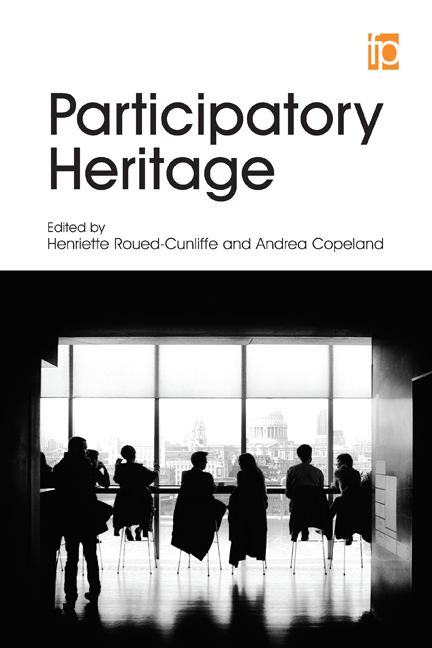Book contents
- Frontmatter
- Contents
- List of figures and tables
- Contributors
- Introduction: what is participatory heritage?
- Part 1 Participants
- Part 2 Challenges
- 8 Custodianship and online sharing in Australian community archives
- 9 Who is the expert in participatory culture?
- 10 Social inequalities in the shaping of cultural heritage infrastructure
- 11 No Gun Ri Digital Archive: challenges in archiving memory for a historically marginalized incident
- 12 Giving voice to the community: digitizing Jeffco oral histories
- 13 Issues with archiving community data
- Part 3 Solutions
- Further reading
- Index
12 - Giving voice to the community: digitizing Jeffco oral histories
from Part 2 - Challenges
Published online by Cambridge University Press: 08 June 2018
- Frontmatter
- Contents
- List of figures and tables
- Contributors
- Introduction: what is participatory heritage?
- Part 1 Participants
- Part 2 Challenges
- 8 Custodianship and online sharing in Australian community archives
- 9 Who is the expert in participatory culture?
- 10 Social inequalities in the shaping of cultural heritage infrastructure
- 11 No Gun Ri Digital Archive: challenges in archiving memory for a historically marginalized incident
- 12 Giving voice to the community: digitizing Jeffco oral histories
- 13 Issues with archiving community data
- Part 3 Solutions
- Further reading
- Index
Summary
ORAL HISTORIES PROVIDE a unique opportunity for the preservation of cultural heritage and community engagement by collecting life stories, documenting shared experience and giving voice to community members. Digital technologies have improved the process of recording oral histories and offer innovative methods for their organization, dissemination and archiving (Boyd, 2011). New means of discovery and distribution are available, granting new levels of access not only to born-digital recordings but also to older oral histories recorded on analogue media. Digitization both expands access to valuable first-hand accounts recorded in the past and addresses preservation concerns, since many analogue recordings were originally created on tapes that deteriorate and become fragile with time.
The digitization of oral history collections has been undertaken primarily by university and audiovisual archives with well-established digital infrastructures for hosting and preserving digital assets (Daniels, 2009; Stevens and Latham, 2009; Weig, Terry and Lybarger, 2007). Public libraries and small cultural heritage institutions engage less frequently in building digital collections of oral histories, due to their relative lack of technical expertise and the challenge of acquiring affordable content management systems and digital preservation solutions. Partnering with other institutions and collaborating with researchers and community stakeholders is one way of expanding access to oral history collections (McKether and Jeter, 2011).
This chapter presents a case study of Jeffco Stories, a collection of digitized oral histories created by the Jefferson County Public (JCP) Library in Colorado, in the USA. The project was created in collaboration with local historical societies and with the assistance of faculty and graduate students from the Library and Information Science (LIS) programme at the University of Denver, located in Denver, Colorado. The online collection, Jeffco Stories, currently includes 163 oral histories. It was recently migrated to open source content management software, Omeka, and is available at http://jeffcostories.omeka.net/. This chapter contributes to research on the digitization of oral histories at small and mid-sized cultural heritage institutions and is particularly relevant to librarians and archivists who are exploring access and preservation solutions for digital collections.
Oral history background
Oral history is a systematic way of collecting personal life stories and memories of historical and community events through recorded interviews (Ritchie, 2003). It is a recognized research method in history and the social sciences that acknowledges spoken memories as primary source materials.
- Type
- Chapter
- Information
- Participatory Heritage , pp. 117 - 128Publisher: FacetPrint publication year: 2017
- 1
- Cited by



